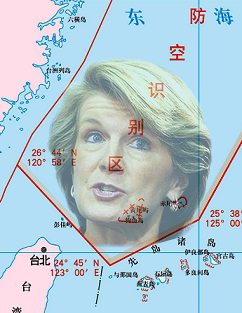Motives questioned in Bishop's China air call
 Australia’s foreign minister has felt the wrath of the waking dragon, upsetting the Chinese government with her claims over their air-space.
Australia’s foreign minister has felt the wrath of the waking dragon, upsetting the Chinese government with her claims over their air-space.
A small stoush has erupted following China’s declaration that all aircraft must notify authorities before flying into the 'air defence identification zone' (ADIZ), which covers several contested islands.
Foreign Minister Julie Bishop summoned Beijing's ambassador this week to express Australia’s opposition to the zone, which she called “coercive action... that could add to the tensions that currently exist.”
In response, China levelled very similar criticism against Ms Bishop, saying in a statement; “Australia's irresponsible statements on the East Sea air defence identification zone are completely mistaken; China cannot accept them.”
The United States’ role in the issue has been strongly questioned.
The US says it wants to remain the dominant super power in the Asia-Pacific, refusing to acknowledge the air defence identification zone by flying two unarmed bombers through it this week.
The islands at the centre of the entire dispute are currently claimed by Japan, a claim which is disputed by China. The United States has come out in support of Japan.
Ms Bishop denies that there has been any pressure on Australia’s position from the United States, and said that trade talks will continue.
“China is our major trading partner, we have a very deep and longstanding engagement with China but it is appropriate that each side be able to raise concerns with each other and do it in a way that hopefully will receive appropriate consideration,” she said.








 Print
Print